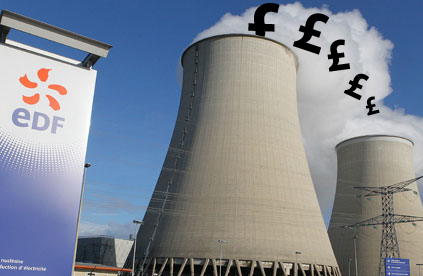CEBR - no negative impact on house prices
A newly published report by independent research firm CEBR finds no evidence of house prices being negatively impacted by wind farms within a 5km radius. The report draws its conclusions from analysis of 82,000 transactions over the past 20 years.
RenewableUK chief executive Maria McCaffery said
"At last we have a detailed independent analysis into what actually happens to property prices before, during and after windfarms are constructed, over a period of nearly 20 years. This shows that claims that windfarms might have a negative effect on house prices are unfounded"
Previous reports from RICS said there was no definitive evidence for negative impacts in the UK and minimal impacts in the US while the LSE claimed an average of 5-6% reduction for properties within 2km of a wind farm.
There still appears to be no evidence that a single community-scale turbine can cause a noticeable reduction and as ever prices will generally continue to move with more dominant issues of the economy and public confidence.
Meanwhile, building society Nationwide's latest house price index showed UK prices have increased by 10.9% in the past 12 months, to an average of £183,577. The monthly rate of growth picked up, with a rise of 1.2% following March's 0.5% increase and the annual rate of inflation is now the biggest rise since June 2007
Tories - "Get ready for shale"
Today's announcement by the Tories that they will do everything in their power to stop any further on-shore wind turbines has been labelled as "pandering to potential UKIP voters" by many. By announcing the future policy now, so far ahead of next years election they also hope to damage investor confidence which could in turn see bank lending for such projects dry up. A double whammy.. Go Dave!
But, look at what else you'll be getting should a majority Tory government be elected. Energy minister Nigel Fallon has been doing his best to promote fracking saying:
"The message is: get ready for shale"
Mr Fallon is urging communities around the country to "get behind fracking" touting the 65,000 jobs it will create. No mention of the same number currently working in the wind industry that would loose theirs. In December 2013 Mr Fallon said he wants to see 2/3'rds of England opened up for fracking.
In January the government rushed through pro-fracking planning reforms despite massive opposition in the Lords with the aim of making it harder for local planning authorities to block future shale gas developments. In today's announcement they plan to do exactly the opposite for wind energy development and make it much easier for plans to be blocked by local councils and the minority of vocal objectors.
Its clear that a majority Conservative government would be a disaster for UK plans to become self sufficient with renewable energy. Remember shale gas is not renewable and will continue to contribute towards climate change. On that very subject we forget at our peril the latest warnings from the IPCC:
"The impacts of global warming are likely to be severe, pervasive and irreversible"
Meanwhile energy experts the world over agree that on-shore wind energy is by far the cheapest and easiest large scale renewable technology. In trying to kill it in favour of shale gas the Tories are showing their true colours - and they 'aint green.
Much more expert reaction to the news can be found here.
Gov U-turn to add ££££'s on energy bills
According to a new report by the independent Committee on Climate Change (CCC) the average UK household could see annual energy bills rise by £8,000 if recent Government u-turns on CO2 reduction go ahead.
Key to the new findings are the decision by George Osbourne to delay new cuts in carbon emissions by 10 years - to 2030. The CCC estimate this will cost the UK economy an additional £100 billion because, as is well known, the earlier we tackle climate change the cheaper and vice versa.
If expected increases in fossil fuel prices occur the cost soars to £200 billion.
“This report shows the clear economic benefits of acting to cut emissions through the 2020s. This provides insurance against the increased costs and risks of climate-related damage and rising energy bills that would result from an alternative approach to reduce and delay action.” - Lord Debden, CCC chairman.
But, don't just take the CCC's opinion (although they are the official body setup by the Government in response to the Climate Change Act 2008) as 100 major companies have also called upon Osbourne and Cameron to stick to the original plan. Signatories include Sainsbury, Asda, Ikea, O2, Nestle and Unilever.
Speaking for the group, Lord Adair Turner, a former director-general of the CBI, said:
“The majority of the business world is clear that ambitious and stable action to tackle climate change makes business sense. A stable policy environment is critical to attracting investment in the low-carbon sector.”
Instead, subsidies for renewables are being cut and tax breaks awarded to anyone wanting to invest in 'fracking'. So the 'cut' of £50 off domestic energy bills announced last week should perhaps be viewed as nothing more than a pre-election 'bribe' because the warning from the CCC is clear..
Not acting fast enough to tackle climate change will cost each and every one of us dearly in the long run.
UK CO2 levels continue to rise
The Independent reports that UK carbon emissions for 2011 jumped by 2.6% despite the economy only growing by 0.3% over the same period.
The increase was seen to result from a move back to burning dirty coal by electricity generators.
Full report here
Its the gas price, stupid!
Following SSE's announcement of energy price increases averaging 8.2% for its customers, the usual round of political finger pointing was in full evidence with climate-change-deniers and fossil-fuel-lobbiests all wading in.
The age old lie? That renewable energy and green policy is to blame. But is it?
SSE's figures show that the price hike will average £93 a year for a typical household. Of that, £23 is due to increases in wholesale energy prices, £28 for re-investment back into the grid infrastructure and smart metering, £5 in VAT, £15 in "green taxes" and a remaining £23 which is "unaccounted" for bit includes SSE's profit.
Official figures from OFGEM show that support for renewables has added £15 to the average household annual energy bill of which on-shore wind accounts for just £4.68. In addition Government subsidy for most forms of renewable energy have been or are being cut significantly.
Gas prices have added over £120 per year per household.
With an ageing number of nuclear and dirty coal power stations being decommissioned and the Government hoping a second dash for gas to fill the gap, its no wonder they are so keen for fracking to be successful. Without fracking the UK will need to import ever more expensive LNG (liquid natural gas) in competition with global markets.
Over the forthcoming decades the increasing price of fossil fuels will become an ever increasing financial burden on the UK, unless we act to reduce our dependency.
UK facing black-outs?
The BBC seems to think so. We'd tend to agree given the schizophrenic planning system in this country.

Keeping the lights on
OFGEM report today that UK electricity generation capacity will drop by 10%..
Not this year... but by this April
This is despite several ageing nuclear power stations continuing to run well past their intended life span. George Osbourne's new dash-for-gas it likely to represent only a short term fix as wholesale prices for imported gas continue to rise. In the meantime even some Tories has described the current policy as "short sighted and costly".
As we have long argued, the UK needs to rapidly install as much renewable capacity as it possibly can - and quickly. While no one technology holds the answer the simple truth is that we need a lot more of everything - wind, solar, hydro, tidal, biomass just to keep the lights on, let alone to meet our future electricity needs.
UPDPATE (24/02/2013)
The Sunday Express today reports that nearly 1 million homes faced power cuts in January as National Grid scrambled to find enough electricity during the cold weather. The article claims that old power stations (currently due for imminent closure) were bought back on line to make up the shortfall. If the same happens again next year some parts of the UK could face black outs.
EDF want HUGE subsidies for new nuclear

According to the Telegraph, EDFs CEO Vincent de Rivaz says he wants 14p per kwh of electricity before he'll build a new nuclear plant.
EDF is negotiating with ministers over a guaranteed electricity price in order to proceed with the project. It is likely to receive billions of pounds in subsidies, paid for through levies on all UK electricity consumers, if the market price remains below that level.
What? Isn't nuclear supposed to be the "cheap option" that costs soooo much less than renewables?
Ultra-expensive solar-pv only gets 21p per kwh and onshore wind only costs around 9p, so EDF must be smoking something to ask for this much. Surely even Climate-Change deniers sceptics would prefer to have onshore wind farms rather than nuclear power at that price?
Has Saudi oil peaked?

The likes of ASPO and Matt Simmons have been warning that Saudi cannot be depended on to meet the shortfall in world oil demands for much longer. Now a front page article in The Telegraph quotes the latest analysis by industry experts that predict Saudi will cease to export oil by 2030.
Until now Saudi has constantly increased production as other major wells in other oil producing states have matured and then peaked. In recent years much of the extra oil was not the sweat light crude that everyone wants... but heavier low grade oil that requires more costly refinement. Clearly the signs have been there for all to see.
No wonder then that recent announcements from the Kingdom regarding massive rollouts of solar PV and even nuclear power plant.
As Matt Simmons says... when Saudi oil production peaks, the worldwide production of oil will have peaked. Expect $500/barrel oil anytime soon.


Climate and Energy
Back in June this year Lord Stern (the world’s most authoritative climate economist) warned that the financial damage resulting from Climate Change will be much greater than predicted by current forecasts which have assumed increases in global temperatures will be limited to 3 degC.
In recent months the worldwide consensus has moved to a discussion about not IF the world will hit 3C, but by how much this will be exceeded. Newly published reports include temperature rises up to 6 degC above pre-industrial levels which result in "catastrophic outcomes".
Additional research also predicts that severe financial impacts are likely to appear well before the actual physical effects cited above. By way of an example the state of California is now its third full year of drought and agriculture within the Central Valley, which produces almost 50% of US grown fruit and vegetables, is struggling to adapt. Economists predict the knock-on costs to every US household in increased food bills will top $500 annually.
Meanwhile the Independent newspaper reports this week that Britain continues to see an increasing risk of widespread electricity blackouts unless more is done to develop smarter solutions to save excess renewable energy at the point of generation.